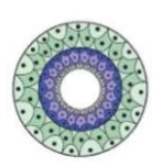The character that gives the Phylum Chordata its name is shown by:

1.
A
2.
B
3.
C
4.
D

The structure shown in the given diagram is characteristically seen in the Phylum:
1. Porifera
2. Ctenophora
3. Cnidaria
4. Molluska
An animal with the following body wall organization will not have:

| 1. | Cepahilzation |
| 2. | Three germ layers |
| 3. | Bilateral symmetry |
| 4. | A complete digestive tract |
In some Bilateria, the body is of many segments that show serial repetition of parts. Such segments are called as:
(1) Myotomes
(2) Metameres
(3) Proglottides
(4) Comb plates
The phylum with exclusively marine animals is:
(1) Porifera
(2) Cnidaria
(3) Ctenophora
(4) Platyhelminthes
Chordates are not characterized by:
(1) Ventral nerve cord
(2) Post anal tail
(3) Gill slits
(4) A notochord
Notochord is derived from embryonic:
(1) Ectoderm
(2) Mesoderm
(3) Endoderm
(4) Ectoderm and Mesoderm
What is present between ectoderm and endoderm in diploblastic animals?
(1) Mesenteron
(2) Mesenchyme
(3) Mesorchium
(4) Mesoglea
What is not true regarding Cnidarians?
(1) Body is made of distinct tissues but true organs have not evolved
(2) They are carnivores
(3) They may have two body forms – polyps and medusa
(4) The digestion is completely intra-cellular
Ascaris is characterized by:
(1) Presence of true coelom but absence of metamerism
(2) Presence of true coelom and of metamerism
(3) Absence of true coelom but presence of metamerism
(4) Presence of neither true coelom nor metamerism







